
- Details
- By Neely Bardwell
WASHINGTON — President Donald Trump signed a memorandum Thursday directing the Secretary of the Interior to explore paths toward federal recognition for the Lumbee Tribe of North Carolina.
The memorandum, which does not grant federal status to the 55,000-member tribe, directs the Interior Department to submit a plan within 90 days outlining options for the Lumbee to gain full federal recognition and benefits. Trump is the first president to sign such a memorandum.
“Considering the Lumbee Tribe's historical and modern significance, it is the policy of the United States to support the full Federal recognition, including the authority to receive full Federal benefits, of the Lumbee Tribe of North Carolina,” the memorandum states.
North Carolina recognized the Lumbee in 1885. President Dwight D. Eisenhower signed the 1956 Lumbee Act which recognized the tribe but denied federal benefits that federally recognized tribes receive. Based in Pembroke, N.C., the Lumbee has an estimated 55,000 members, making it the largest tribe east of the Mississippi River and the ninth-largest tribe in the Nation. There are 574 federally recognized tribes in the United States.
“This is a great step for the new Administration and we encourage Congress to move forward with codifying this policy of President Trump toward full federal recognition of the Lumbee People,” Lumbee Chairman John L. Lowery said in a statement.
Tribes can gain federal recognition through congress legislation, federal court decisions, or through the Department of Interior’s Office of Federal Acknowledgement (OFA) process. Trump’s memorandum directs the DOI to investigate any and all legal avenues in advancing the Lumbee Tribe’s recognition.
In 2024, the House of Representatives passed the Lumbee Fairness Act, which would have granted Lumbee full federal recognition, but the legislation died in the Senate. Similar legislation has passed the House of Representatives multiple times.
During his 2024 campaign, Trump promised to support the tribe’s efforts to be federally recognized.
“Today, I’m officially announcing that, if I am elected in November, I will sign legislation granting the great Lumbee Tribe Federal recognition that it deserves,” Trump said on Sept. 23, 2024.
Principal Chief Michell Hicks of the Eastern Band of Cherokee Indians, based in Cherokee, N.C., urged the Department of the Interior to ensure that due diligence and factual analysis guide their recommendations to President Trump in order to protect the integrity of federal recognition.
“The Lumbees have a history of shifting claims, including claiming Cherokee ancestry and other historical tribes. Experts have repeatedly found that their claims cannot be verified through historical or genealogical evidence,” Hicks said in a statement. “Any process for evaluating Lumbee’s claims must be rooted in objective standards and a thorough, evidence-based review. Self-identification and sincere belief in Indian ancestry, while meaningful on a personal level, cannot mean tribal nationhood and sovereignty.”
More Stories Like This
Native News Weekly (August 25, 2024): D.C. BriefsNavajo Nation Gaming Enterprise Marks Problem Gambling Awareness Month With $3.4M in Support
Cheyenne River Youth Project to Celebrate Women’s Strength at Barbie-Themed Passion for Fashion on March 14
Celebrating Native American Women
Native Bidaské: The Illusion of Freedom and the Myth of America 250, Leonard Peltier Speaks Out
Help us defend tribal sovereignty.
At Native News Online, our mission is rooted in telling the stories that strengthen sovereignty and uplift Indigenous voices — not just at year’s end, but every single day.
Because of your generosity last year, we were able to keep our reporters on the ground in tribal communities, at national gatherings and in the halls of Congress — covering the issues that matter most to Indian Country: sovereignty, culture, education, health and economic opportunity.
That support sustained us through a tough year in 2025. Now, as we look to the year ahead, we need your help right now to ensure warrior journalism remains strong — reporting that defends tribal sovereignty, amplifies Native truth, and holds power accountable.
 The stakes couldn't be higher. Your support keeps Native voices heard, Native stories told and Native sovereignty defended.
The stakes couldn't be higher. Your support keeps Native voices heard, Native stories told and Native sovereignty defended.
Stand with Warrior Journalism today.
Levi Rickert (Potawatomi), Editor & Publisher

